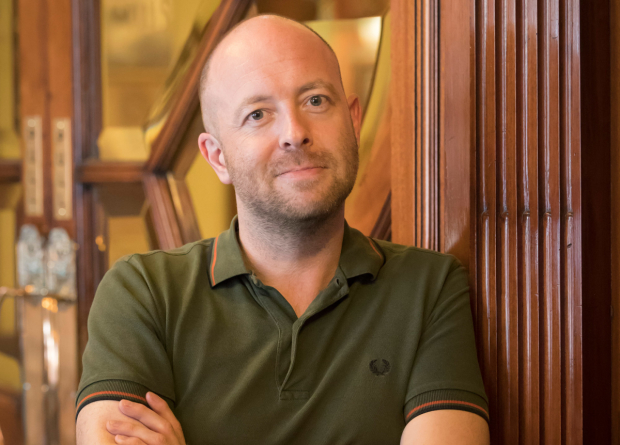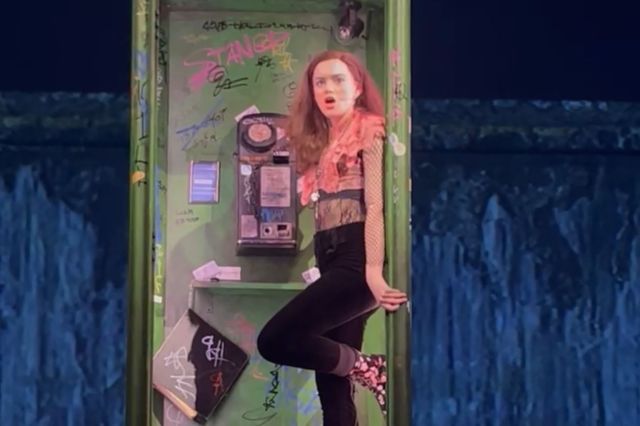John Tiffany: I didn’t want to be the person that made Harry Potter boring
As his hit production of ”The Glass Menagerie” opens in London, the director explains why Tennessee Williams’ play is so relevant and looks back at his work on ”Harry Potter and the Cursed Child”

© Johan Persson
John Tiffany must be crazy. Anyone who agrees to take one of the world’s most popular book series and put the latest, brand new story on stage, must be a little doolally. But that’s exactly what Tiffany has done with JK Rowling and Jack Thorne. And, amazingly, he helmed the staging of Harry Potter and the Cursed Child so well that it did anything but disappoint. It was glorious. But then, should we be surprised? For over 20 years, Tiffany has been creating astounding theatre. From his work at Traverse in Edinburgh to new writing theatre company Paines Plough, to his production of Black Watch and his staging of Tony Award-winning Once to the vampire thriller Let the Right One In. Tiffany delivers thrilling, unique, big, intense and beautiful productions of daring plays. Though he often directs new works, his most recent London addition is a little different. His production of The Glass Menagerie has arrived, after runs on Broadway and in Edinburgh, in the West End with Doubt and 24 star Cherry Jones as Amanda Wingfield. As ever, Tiffany has injected his brilliance into it: it’s a fresh, exciting production of a vivid and important play.
This is the fourth time you’ve mounted this production, is it hard to revisit the show?
It’s a very different kind of experience to when you’re creating it for the first time. But I’ve mainly done new projects and new plays and often the rehearsal process is: 'how do we make this work', whereas with a play like The Glass Menagerie, it doesn’t need me to tell the world that it works. From the start it was about working out how this play works for an audience in 2013 [when it was first staged in the US]. Then two years later, when we staged it at the Edinburgh Festival, the world was a very different place. In the play Tom refers to the rise of fascism quite a lot. You always look at the world around you and say – does this change how an audience might connect with the play?
So do the recent events in America have an impact on the show?
This isn’t a play written about Donald Trump, much as he’d like to think every play was written about him. But it is a play that explores the beginning of real capitalism in America and the whole notion of the American dream. [In their works,] Tennessee Williams and Arthur Miller were warning us, really, about the inbuilt disease of the American dream. In lots of ways that’s why we come to the theatre, not to be depressed about the state of the world, but to try and understand more about what the world is feeling. Technically and theatrically everything is very much the same as when I first conceived it five years ago.
Was it important for you to make sure Cherry Jones was part of the project?
The Glass Menagerie has always been my favourite play. It has always connected with me and made me cry. But I never thought I would direct it because I mainly do new plays and new projects. I met Cherry while I was studying at Harvard on a sabbatical from the National Theatre of Scotland and I found out that she was from Tennessee. It was then that I thought: I could finally do The Glass Menagerie with real life American actors.
But it took a while to get Cherry to accept?
She was really resistant, because she had an idea of the play and particularly Amanda. But together we realised that she wasn’t just another of Williams’ faded southern belles. This was a woman who had brought up two kids on her own for 16 years in the middle of a depression in St Louis. All she cares about is making sure her kids survive and thrive. She’s a single mother, she’s living in this shitty apartment where you have to enter via a fire escape. Cherry says that she’s probably the last generation that remembers those women. Suddenly it felt very significant to me to be doing The Glass Menagerie with a woman born and bred in Tennessee.
When you were preparing for this, you had also just finished Harry Potter…
Yes, we opened Harry Potter and the next day me and Steven Hoggett got on the train to Edinburgh to go to a tech run for The Glass Menagerie at the Edinburgh International Festival. Jo [JK Rowling] lives in Edinburgh of course as well, and she is much more famous and causes more of a stir than I do. She said she would come to the show in London because she just couldn’t come to Edinburgh, especially after Cursed Child opened. But I had lots of copies of the play text shoved in my face with pens for me to sign.
Did you ever hesitate when taking on something as big as that?
Yes, I suppose that was to do with the responsibility of what I knew this meant to theatre. I knew a huge amount of the audience would be first time theatregoers. I wanted to make sure we could deliver something that wasn’t disappointing. I had read those books with my nephews and God-kids and had seen how they connect with the emotional heart of it. I knew that I didn’t want to be the person that made Harry Potter boring. I also knew I would have to call on all my collaborators from over the years. I would need everybody standing with me. It took two years full-time work. But if you’re going to do it for one project, it might as well be this one.
The queues – digitally and in person – have been insane…
You spend your life desperately trying to get people into the theatre and then a show like this comes along… We knew it would be popular, but my heart goes: Oh God, I want those people that really want to see it to come. But once we’ve got more productions open around the world, that will alleviate the pressure.
It’s opening on Broadway?
We’re in developed discussion with Broadway. So hopefully that will be confirmed quite soon.
You’re directing Pinocchio at the National Theatre this Christmas…
Yes, it’s the crew, it’s the team. It’s Steven Hoggett who worked on Harry Potter, Bob Crowley who designed The Glass Menagerie, Martin Lowe who did Once, Harry Potter, The Twits, Jamie Harrison who did the magic on Harry Potter, Toby Olie who is our puppeteer. It’s so exciting that the songs are going to be heard for the first time onstage.
Was it very hard to get Disney to sign that off?
Not really. They don’t easily allow you to play around with films written before The Little Mermaid, because they are such strange beasts. There are only five songs in Pinocchio and we’re not planning on writing new songs, because they are always disappointing. I mean, how can you write a song that sits alongside "When You Wish Upon a Star"? But it will be a lot of new music and we are adapting the songs so they will feel very different and right for us.
The Glass Menagerie runs at Duke of York's Theatre until 29 April.
Click here to buy to tickets to The Glass Menagerie














